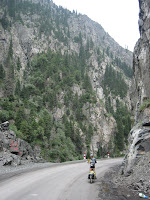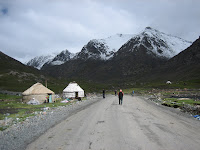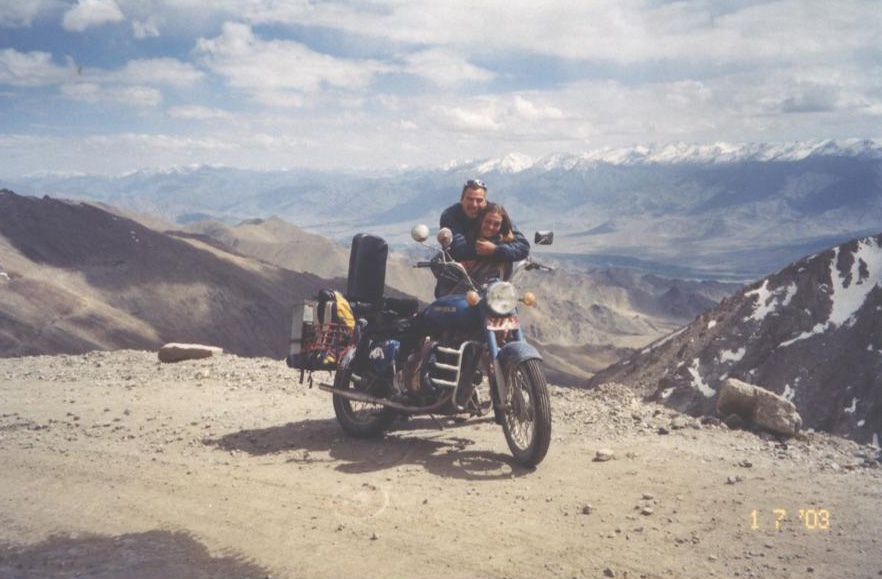Gal said we should take the mountain road. We didn’t want to take the flat desert road, which bypasses the mountains, returning 150km we’ve already cycled.
The guys at the bicycle shop (there are a few in Urumqi) told us the route is beautiful and the road is good.
So, we finally left Urumqi.
We planned on leaving early, to avoid the traffic. We set the alarm clock for 05:20 and, mysteriously, Gal woke up at 06:20.
We packed quickly, departed from the warm, helpful staff and went the wrong way. Due to the language barrier, or 2 stupid tourists, wanting to go to Kashgar through the mountains, we added about 15km within the city limits to our courageous exit.
We were climbing gradually, on a straight road, for 30km. On both sides were farm lands and a few scattered hills. We finally reached YongFang, a small village, cut in 2 by the highway (G216).
The first house of the village was a guesthouse, with a simple, nice room, a clean shower, a roof and a friendly relaxed atmosphere.
We know the name of the village, because we were invited for dinner by a local couple (from Urumqi, weekend tourists). Among other things, they told us the name of the village. Since we left Sichuan, we have no map in English. Till then we had "Nelles" maps. By comparing the English map with the local maps we bought, we could easily navigate, communicate easily and update this incredible blog. Now, we’re using the vague, undetailed map of our shitty guide book.
It doesn’t matter too much, except for updating our blog.
He also told us that the mountains we’re heading to are the "Switzerland of XinJiang".Stopping early, at this relaxed village, was good for us, after all the pressure of the last few weeks.
 Sunset from the rooftop.
Sunset from the rooftop.The next day the farm-lands changed to hills, and in one twist of the road we were in a deep gorge, with alpine forests around us. After many kms inside the narrow gorge, just as Gal said she had enough of this claustrophobic place, it opened to grasslands, surrounded by high mountains.
It started to rain. XinJiang is supposed to be a desert; rain, green mountains - what is this?
Then, in the middle of this pastoral valley, we reached this huge, ugly, polluting industrial area. Unfortunately, the village we wanted to sleep in was just there, and an ugly village it was. Due to the heavy rain, we were forced to stay.
It was still raining when we woke up, the following day, but staying was out of the question. We continued to climb, cycling through another beautiful gorge and back to grasslands. We were over 3,000m, starting to think the pass may actually be, as 2 local maps showed, at 4,200!
We stopped 20km from the pass, and slept in a room at a "road workers camp".

 Farm lands.
Farm lands.
 Hills.
Hills.
 Hillier.
Hillier.
 Entering the Gorge.
Entering the Gorge. 







 Looking back at the road workers camp.
Looking back at the road workers camp.The next day we finally attacked the pass. All the way, in the last few days, locals warned us about snow. But, what snow? We’re in the desert! The sky was blue, not a cloud in the sky.
The last 11km, twist backs on a falling-apart cliff, were not paved. Out of the blue, a storm came. It took us an hour to push the bikes through heavy snow the last 3km , with visibility of not more than a few meters. The whole valley disappeared. Our hands and feet were frozen.
As we finally reached the amazing pass, the storm vanished, the valley `came back` and the scenery was stunning.
Just the thought of climbing so much, and then no views in the pass!
After 10 minutes, in which we defrosted, is started to rain, and didn’t stop till the evening. Soaked, we started descending a 100km unpaved road. Due to the snow, Gals` rear brakes didn’t work and Ramis` gear were stuck on 1-1 (the lowest gear). We enjoyed an amazing rainbow.


 Can you see the amazing pass?
Can you see the amazing pass? Yurts.
Yurts. Unpaved...
Unpaved...
 Glaciers.
Glaciers. 
 Snow.
Snow. To the pass.
To the pass. Finally!
Finally!
 Enjoing the pass.
Enjoing the pass. 



 Going down.
Going down.

 The perfect rainbow.
The perfect rainbow.
We were invited to sleep at the building of the train workers, which was cleaner than the local hotel in ways the English language cannot describe.
The next day we fixed/cleaned the bikes, reached the paved road and enjoyed the ride, descending back to the desert, to Korla.






 Leaving the mountains behind us.
Leaving the mountains behind us. A market on the way.
A market on the way.




14/07/07 Desert
We returned to the desert, as quickly as we left it. We were heading west, towards Kashgar, our last destination in China.
The road went west, just south of the mountains, so we had 1,000 km of flat desert to our left and snow peaked desert mountains to our right.
Every 50-200 km was a town or a village, with its green fields and orchards, water canals and, well – an oasis!
Cycling the desert parts was fine; the road was fantastic, the terrible heat was not too bad while cycling, the thoughts running away and the scenery interesting (in an endless sort of way). Only the head wind was bad, slowing us all the way into Kyrgyzstan.
And then we reached an oasis… The change from the dead desert to the lush green fields, the watermelon and melon stalls, sweeter than those in Israel, the simple restaurants with fresh pasta (“Gamba” - a popular local dish), clay ovens with fresh Nan-bread and more.
People are very friendly and welcoming, not greedy. Except for the big cities, the majority of the people are Uygur, in contrast to the Han-Chinese. Maybe, because of their similarity to Israel and the Middle-East, communication between us was easier. Even their hand and body language was similar.
It was easy to find a simple cheep hotel, you just need to manage to reach the next oasis, maybe 50km away.
Unfortunately, we were running out of visa time in China, so we had to hitch parts of this section. 1 hour on a fast truck is equivalent to a whole cycling day. If only we had all the time in the world.
There is talk about XinJiang (the Uygurs) lusting for independence. We didn’t get to talk politics with them (Tibetans were very clear about the Chinese oppression), but it’s quite clear that they are ill-treated by the Han government, compared to the Hans in XinJiang
Anyway, for us, XinJiang province was our favorite in China. People and places full of character, cold beer everywhere, fresh bread (not rice!), live markets…
We agree with what many travelers say, that XinJiang doesn’t feel like China and it’s the ‘best’ province in China, for traveling.




18/07/07 - Kashgar
Kashgar - our last destination in China.
If we loved XinJiang because it was not Chinese, Kashgar has nothing to do with China (except for the new part of town).
After a quick scan of part of the old town, we decided to sleep in Qini-Bagh hotel, a big complex, funny, expensive and filled with funny Chinese tourists, but with a `backpacker wing` at the back, to hide the cheap, foreign travelers from the rich Chinese tourists.
A run down hotel, neglected since the 70`s. It had a shaded inner balcony, good for mingling with other tourists, over a watermelon or just escaping from the heat. The surrounding area, the `old city`, is all mud-brick houses, small dirt alleys, Shish-Lyk restaurants with clay ovens for preparing Nan and other breads, food stalls and a live market atmosphere.
The city has a very Central Asia cosmopolitan feel to it, with Uygur, Han-Chinese, Kyrgyz, Tajiks, Uzbeks, Kazaks, Russians and others from all over Central Asia. All doing business, buying from China everything, from shoes to used cars, and exporting it back home (in the newly bought used cars). The biggest `used car market` was in the parking lot of our hotel.
So, Kashgar was all we have imagined of a Silk Road city, always interesting, always alive + a hotel we could actually relax in and mingle with other foreigners.
P.S. - there’s a good "GIANT" bicycle shop in the new part of town.
 A fancy watermelon stall, entering Kashgar.
A fancy watermelon stall, entering Kashgar.  Part of the old walls.
Part of the old walls. Sunday market.
Sunday market. Parking problems?
Parking problems?23/07/07 - To the Border
After 5 relaxing days in Kashgar, it was time to leave, jut after the wonderful Sunday Market and 3 days left to the beginning of our Kyrgyz visa.
We had a 200km climb; with the same terrible head-wind we’ve been fighting the whole last month. The scenery was fantastic, ever-changing desert mountains (could desert mountains be so diverse?), helping us overcome the wind. After a long 100km day, we reached Wuqia, mentioned just as a small village on our map. Actually, it was a classic Chinese town, like a million others, with a majority of Han-Chinese, a typical, good, clean, everything-working, 100Yuan, no-character hotel, a supermarket with the usual stock (everything), including the important `wet tissue` packs. How did the camel convoys of the ancient days manage without them?
We mention the town due to it’s proximity to the border, and it’s being in the middle of the Uygur country. One cannot not think of what reason made the Chinese government "put" (there is a factory near Beijing, manufacturing these towns, like the "Fx-calculators" factory, and then big lorries take these towns to different locations) this town there, maybe for the cyclists, riding the Kashgar-Osh 10 day section, giving them a chance to shower and buy sullies?
 Puncture - macher
Puncture - macher


 Camping.
Camping.



 To the border.
To the border.
No comments:
Post a Comment